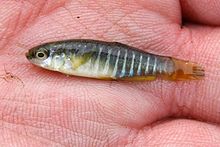Aphaniidae
| Oriental killifishes | |
|---|---|

| |
| Aphanius fasciatus | |

| |
| Esmaeilius sophiae | |
| Scientific classification | |
| Domain: | Eukaryota |
| Kingdom: | Animalia |
| Phylum: | Chordata |
| Class: | Actinopterygii |
| Order: | Cyprinodontiformes |
| Family: | Aphaniidae Sethi, 1960 |
| Genera | |
|
See the text | |
Aphaniidae, the Oriental killifishes, are a family of the order Cyprinodontiformes. The 42 extant species of the family inhabit inland waters, rivers and lagoons. The distribution of these species extends from the entire Mediterranean region throughout the neighboring states of the Red Sea and Persian Gulf to southwest India. Several species in this family have very small distributions and are seriously threatened.[1][2]
Characteristics
Aphaniidae are small fishes that usually grow to a length of 3 to 15 cm (1.2 to 5.9 in). Their bodies are moderately elongated and only slightly flattened at the sides. The mouth is short and their teeth are tricuspid. Scales are complete, but can also be reduced or completely absent. All fins are rounded, dorsal and anal fins similar and are almost symmetrical, the pelvic fins can also be very small. There is usually sexual dimorphism and females are usually larger and have dots or spots on a solid colored background. The males often have horizontal stripes. There can also be significant color dimorphism within a species, due to populations that lived completely isolated from one another.[3][4]
Ecology
The Aphaniidae species mostly live in small and tiny bodies of water with fresh, brackish or sea water. These can be springs, ponds, swamps, lagoons, canals or ditches. The bodies of water are often directly connected to the sea and have a high content of sulphides or magnesium compounds . Salinity and temperatures can fluctuate greatly, the latter both on an annual basis and between day and night. The fish avoid flowing water and feed on plants as well as various small animals and detritus.[5]
Taxonomy and systematics
Aphanius, the type genus of the Aphaniidae, was introduced in 1827 by the Italian naturalist Giovanni Domenico Nardo. The American ichthyologist Lynne R. Parenti placed the genus together with the South American Andean killifish (Orestias) within the family Cyprinodontidae in the tribe Orestini.[3] Because of the polyphyly of the Cyprinodontidae, the genus was transferred to an independent family, the Aphaniidae, in mid-2017 by the German ichthyologist Jörg Freyhof and two Turkish colleagues. The name was first mentioned in a dissertation in 1960.[6] With the introduction of the genus Paraphanius and the revalidation of Aphaniops in April 2020, the family is no longer monotypic.[7][8] In mid-2020s, two more genera were newly introduced and three genera were revalidated, so that the Aphaniidae now consists of eight genera :
- Anatolichthys Kosswig & Sözer, 1945
- Aphaniops Hoedeman, 1951
- Aphanius Nardo, 1827
- Apricaphanius Freyhof & Yoğurtçuoğlu, 2020
- Esmaeilius Freyhof & Yoğurtçuoğlu, 2020
- Kosswigichthys Sözer, 1942
- Paraphanius Esmaeili, Teimori, Zarei & Sayyadzadeh, 2020
- Tellia Gervais, 1853
References
- ^ Jörg Freyhof; Baran Yoğurtçuoğlu (13 July 2020). "A proposal for a new generic structure of the killifish family Aphaniidae, with the description of Aphaniops teimorii (Teleostei: Cyprinodontiformes)". Zootaxa. 4810 (3): 421–451. doi:10.11646/zootaxa.4810.3.2. PMID 33055730.
- ^ "Family Aphaniidae - Oriental killifishes". FishBase.
- ^ a b Lynne Parenti (January 1981). "A Phylogenetic and Biogeographic Analysis of Cyprinodontiform Fishes (Teleostei, Atherinomorpha)". Bulletin of the American Museum of Natural History. 168 (4): 335–557.
- ^ Hamid Reza Esmaeili, Sorour Echreshavi, Amir Hassan Masoumi, Abbas Motlagh Nejad (2023). "On a remarkable sexual dimorphic trait on scales and fins of the old world Cyprinodontiformes (Actinopterygii: Aphaniidae)".
{{cite web}}: CS1 maint: multiple names: authors list (link) - ^ Steinbach, Gunter (1984). Süßwasserfische in europäischen Gewässern. Mosaik Verlag, München (in German).
- ^ Sethi RP (1960). Osteology and phylogeny of oviparous cyprinodont fishes (order Cyprinodontiformes) (PhD thesis). University of Florida.
- ^ Hamid Reza Esmaeili; Azad Teimori; Fatah Zarei; Golnaz Sayyadzadeh (16 April 2020). "DNA barcoding and species delimitation of the Old World tooth-carps, family Aphaniidae Hoedeman, 1949 (Teleostei: Cyprinodontiformes)". PLOS ONE. 15 (4): e0231717. Bibcode:2020PLoSO..1531717E. doi:10.1371/journal.pone.0231717. PMC 7162479. PMID 32298351.
- ^ Jörg Freyhof; Müfit Ozulug; Gülşah Saç (July 2017). "Neotype designation of Aphanius iconii, first reviser action to stabilise the usage of A. fontinalis and A. meridionalis and comments on the family group names of fishes placed in Cyprinodontidae (Teleostei: Cyprinodontiformes)". Zootaxa. 4294 (5): 573–585. doi:10.11646/zootaxa.4294.5.6.
